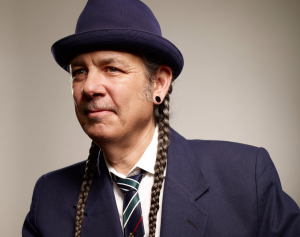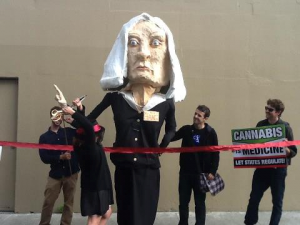Haag closed 600 dispensaries; Harborside Health Center’s Steve Deangelo says next step is repairing industry’s relationship with banks.

Regardless of what US Attorney Melinda Haag’s resignation could mean for the cannabis movement in California, Harborside Health Center founder and marijuana activist Steve Deangelo says his community should be savoring this moment. “It’s something we should take a good deal of pride in,” he told 48 Hills in a phone interview yesterday. “We’ve managed to outlast a fiercely determined federal prosecutor.”
His enthusiasm for the end of her five-year stint in the office is understandable. Haag’s commitment to persecuting the marijuana industry — her office was responsible for shuttering over 600 dispensaries — seemed inexplicable in the face of U.S. Deputy Attorney General James M. Cole’s 2013 memo deprioritizing federal prosecution of state-legal dispensaries. Her particular crusade against Deangelo’s Harborside, which services 200,000 patients at locations in Oakland and San Jose, seemed motivated purely by the club’s size and national prominence.
Deangelo and other cannabis activists and industry leaders seem to have gotten the last laugh here. Now Deangelo asked in our interview, can the next US Attorney please get the banks to start taking marijuana money again?
48 HILLS: What was your initial reaction when you heard that Melinda Haag was stepping down?
STEVE DEANGELO: Joy. Unrestrained joy when I heard Melinda Haag was stepping down. A great deal of relief. Not total relief, but a great deal of relief. But my initial reaction was pure, jump in the air, smile ear to ear joy.
48H: Haag attributes her focus on medical marijuana clinics as being based on community concern. Do you buy that?
SD: No. When she launched her campaign, first of all, the stated purpose from her and the other US Attorneys what that they would go after criminals who were using medical cannabis as a cover for profiteering. What they did, the 600 dispensaries that they targeted and closed through raids and civil forfeiture, were those that allegedly had more than 1,000 plants, or were within the legal distance required from a sensitive site. [In California, dispensaries must be located 1,000 feet from schools, parks, and other entities.]
So for example, there was a dispensary in the Tenderloin that was less than 1,000 feet from a park. That park had been chained and padlocked, no one had gone into it for years. The sidewalks and lots adjacent to it were littered with syringes and crack vials. Across the street there’s a bar and on the corner there’s a liquor store. The idea that a medical cannabis dispensary would be close to a sensitive location there is just ridiculous. There was one El Camino dispensary [that the US Attorneys targeted] and they were actually more than a thousand feet away from the school. They went to court to testify that they were outside the boundary and that’s when they were criminally raided, their stock seized, and shut down. So it was always a subterfuge.
I mean why would they target Harborside Health Center, which has a stellar legal reputation for being 100 percent compliant with existing law? We’ve even gone beyond being compliant and established best practices for the industry. She couldn’t say that we were less than 1,000 feet from a sensitive site, because we’re not. So what she said was we were too big, and simply because of the size of our operation, marijuana could be getting into the hands of those who shouldn’t have it. Nobody’s ever been served at Harborside without legal authorization. I think the real question is, why when every other US Attorney had stopped persecuting medical cannabis, why has Melinda Haag continued to do it for so long?

48H: What will her resignation mean for producers, distributors and consumers of marijuana in Bay Area?
SD: What it means for sure is that we’ve outlasted Melinda Haag, who on a personal level, it seemed, was determined to close the entire medical cannabis scene down, and she failed to do that. I think that it’s a testament to our persistence, our endurance, our strength. It’s something we should take a good deal of pride in, we’ve managed to outlast a fiercely determined federal prosecutor.
Beyond that, we’re not really sure what it means for the future. The interim US Attorney [Chief Assistant US Attorney Brian Stretch] is the head of Melinda Haag’s criminal division. Of course, fortunately we haven’t seen criminal prosecutions of medical cannabis in this district of California, that bodes well for us. But whether or not he’s going to dismiss pending actions against Berkeley Patients Group and Harborside Health Center remains to be seen.
48H: Besides not actively trying to shut down dispensaries, are there ways a US attorney could actually aid the marijuana movement?
SD: The biggest assistance that the US Attorney could give us is just to not pursue any further civil or criminal actions against the industry. It would also be helpful if they would lobby for some common sense measures.
Pressure from the feds has led the banks to cease service to dispensaries, so just about every dispensary I know in California is on an all-cash basis. That’s incredibly dangerous because anyone walking into a dispensary could be targeted for a robbery, not to mention dispensaries themselves. US Attorneys could just speak up and ask that this business be allowed to have credit cards, to have banks.
Even if a US Attorney does not support cannabis, the question should be whether we have dispensaries who have banking services so their transactions can be recorded, tracked and monitored, or should we be cash businesses where nobody really knows what’s going on?




